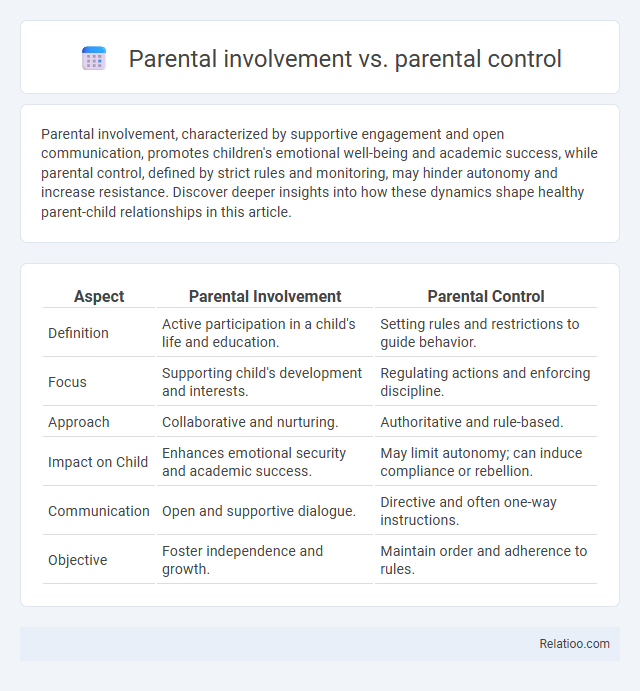Parental involvement, characterized by supportive engagement and open communication, promotes children's emotional well-being and academic success, while parental control, defined by strict rules and monitoring, may hinder autonomy and increase resistance. Discover deeper insights into how these dynamics shape healthy parent-child relationships in this article.
Table of Comparison
| Aspect | Parental Involvement | Parental Control |
|---|---|---|
| Definition | Active participation in a child's life and education. | Setting rules and restrictions to guide behavior. |
| Focus | Supporting child's development and interests. | Regulating actions and enforcing discipline. |
| Approach | Collaborative and nurturing. | Authoritative and rule-based. |
| Impact on Child | Enhances emotional security and academic success. | May limit autonomy; can induce compliance or rebellion. |
| Communication | Open and supportive dialogue. | Directive and often one-way instructions. |
| Objective | Foster independence and growth. | Maintain order and adherence to rules. |
Understanding Parental Involvement and Parental Control
Understanding parental involvement centers on actively participating in your child's education and daily activities to foster emotional support and academic success. Parental control, however, emphasizes setting rules and restrictions to guide behavior and ensure safety, often limiting autonomy. Balancing involvement and control is crucial for nurturing independence while maintaining a supportive environment that encourages growth.
Key Differences Between Involvement and Control
Parental involvement emphasizes active participation in a child's life through nurturing, communication, and support, fostering autonomy and positive development. Parental control, however, centers on regulating and restricting behaviors, often using rules and monitoring to influence outcomes, which can limit independence. The key difference lies in involvement promoting collaboration and trust, while control relies on authority and enforcement.
The Impact of Parental Involvement on Child Development
Parental involvement significantly enhances a child's cognitive, emotional, and social development by fostering a supportive learning environment and strengthening parent-child communication. Unlike parental control, which may limit autonomy and impede self-regulation skills, active involvement encourages independence while providing guidance tailored to Your child's unique needs. Research highlights that consistent parental engagement in education and daily activities improves academic achievement and resilience, underscoring its critical role in holistic child development.
Effects of Parental Control on Children’s Wellbeing
Parental control, characterized by strict rules and monitoring, can negatively impact children's wellbeing by increasing anxiety and reducing self-esteem. In contrast, parental involvement, which emphasizes supportive engagement without overbearing restrictions, promotes emotional security and healthy development. Your balanced approach to parenting should prioritize involvement over control to foster resilience and positive mental health in children.
Balancing Guidance and Autonomy in Parenting
Balancing guidance and autonomy in parenting requires distinguishing between parental involvement, which supports a child's development through active engagement, and parental control, which imposes rules and restrictions that may limit independence. Effective parenting integrates involvement by fostering open communication and emotional support while applying appropriate control to establish boundaries without stifling autonomy. Studies indicate that optimal child outcomes, including higher self-esteem and better social skills, result from parents who maintain supportive involvement while encouraging age-appropriate independence.
Common Misconceptions About Parental Authority
Common misconceptions about parental authority often confuse parental involvement with parental control, though they represent distinct concepts. Parental involvement refers to actively supporting and engaging in your child's development, while parental control implies regulating and restricting behavior excessively. Understanding that healthy parental authority balances involvement with appropriate boundaries prevents misunderstandings about your role in nurturing autonomy and responsibility.
Cultural Influences on Parenting Styles
Cultural influences significantly shape parental involvement, parental control, and overall parenting styles, often reflecting community values and social norms. In collectivist cultures, parental control may be emphasized to align children with group expectations, while in individualistic societies, parental involvement tends to foster independence and personal choice. Variations in parenting approaches across cultures influence children's development outcomes, highlighting the need for culturally sensitive understanding in assessing family dynamics.
Practical Strategies for Positive Parental Involvement
Positive parental involvement enhances children's academic and social development by fostering open communication, setting clear expectations, and actively participating in their learning activities. Practical strategies for your involvement include attending school events, establishing consistent routines, and encouraging problem-solving skills rather than exerting strict parental control. Balancing involvement without overcontrolling ensures children develop independence while feeling supported and guided.
Warning Signs of Excessive Parental Control
Excessive parental control often leads to warning signs such as a child's diminished independence, increased anxiety, and reluctance to make decisions. Unlike balanced parental involvement, which supports development and fosters open communication, overbearing control can stifle emotional growth and cause rebellious behavior. Recognizing these signs early helps parents adjust their approach to promote a healthier, supportive environment.
Fostering Healthy Parent-Child Relationships
Fostering healthy parent-child relationships relies on balanced parental involvement, which emphasizes supportive engagement without overshadowing the child's autonomy, unlike parental control that often enforces strict rules and limits independence. Effective parental involvement incorporates emotional support, open communication, and collaborative decision-making, enhancing trust and mutual respect. Prioritizing involvement over control nurtures a positive environment where children feel valued and understood, promoting their social and emotional development.

Infographic: Parental involvement vs Parental control
 relatioo.com
relatioo.com